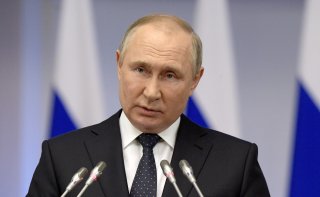Why Navalny's Murder Did Not Kill Opposition to Putin
Both the international community and the Russian people should act on Navalny’s example and their own collective strength to defeat Putin’s war of aggression, weaken his regime, and build a better Russia tomorrow.
The Kremlin completed its slow-motion killing of jailed anti-corruption activist and opposition politician Alexei Navalny last week, snuffing out one of Russia’s leading anti-Putin lights. But the more things change in Vladimir Putin’s Russia, the more they stay the same. Navalny’s murder is a symbolic blow, but certainly not the death knell for opposition to the Kremlin regime. In fact, the imperatives for the West, the Russian opposition, and the Russian public vis-à-vis the Kremlin and its war against Ukraine remain largely unchanged.
Putin remains the most powerful person in Russia; his position is perhaps stronger than ever. In just the last six months, the Kremlin has killed off Navalny and mutinous warlord Yevgeny Prigozhin—the two greatest threats to Putin’s rule. The outlook is similarly bleak elsewhere: the vast majority of outwardly antiwar Russians live outside of Russia; brutal domestic repressions have largely silenced any protests against the war or the Kremlin regime; state censorship has dramatically shrunk the online information space; and Putin’s electoral authorities flicked rising presidential candidate Boris Nadezhdin off the ballot for the March election. All of these measures are aimed at stamping out dissent against Putin and his policies. All the while, Russia continues its war on Ukraine, having turned the tide of the conflict thanks to Western dithering in its provision of weapons to Kyiv.
Unfortunately, Navalny could not have changed any of these phenomena from solitary confinement in the Arctic Circle. But his murder by Russian authorities should spur Western policymakers and ordinary Russians alike to double down on existing priorities to weaken the Kremlin regime, end its war against Ukraine, and begin to work toward a better Russia built not on fear and violence, but on freedom and transparency.
The most important element in countering Kremlin aggression is major Western support for Ukraine. Leaders and public audiences in the United States and Europe already understand that Russia’s aggression in Ukraine is a threat to their nations’ interests and appear remarkably resolved to countering Russia. While transatlantic support for Ukraine has been significant—the United States and Europe have both contributed more than $100 billion to Ukraine’s cause so far—this is small in dollar terms and in fact a smart down payment on American and European security. U.S. aid since February 2022 has been remarkably effective: U.S. support accounts for just 0.32 percent of American GDP and just 5 percent of the annual defense budget, yet has helped Ukraine destroy half of Russia’s military. That’s an incredibly high return on investment, especially considering that Russian officials repeatedly name America as their top enemy.
And yet leaders in the U.S. House of Representatives have refused to even consider a series of bills that would provide roughly $60 billion to support Ukraine’s war effort. By choosing not to help Kyiv further defend itself from Moscow, Congress’s indecision is effectively strengthening Putin’s relative position against Ukraine, Europe, and the United States. The imperative here is straightforward: Speaker of the House Mike Johnson should allow a vote on the Senate-approved $95 billion Ukraine-Israel-Taiwan national security bill that would very likely pass with a strong bipartisan majority. Giving Ukrainians the tools to defend themselves would weaken the Putin regime, which has staked its reputation on the war.
Russian opposition leaders may have little direct impact on the war itself, but they can still loosen the Kremlin’s near-total grip on power in Russia. Navalny came to prominence as an anti-corruption crusader, documenting the ill-gotten excesses of Putin and other Kremlin-connected individuals with sardonic wit and clearly documented evidence. Calling out authorities’ abuses head-on won Navalny followers in Russia and supporters in the West. While he only belatedly argued that Russia retreat to its 1991 borders, Navalny’s vision for a more just, transparent Russia necessarily opposed the country’s recent history of imperial aggression and kleptocracy.
Fortunately, Navalny’s team and several Russian opposition figures have already opposed the war against Ukraine on legal, moral, and strategic grounds and support Ukraine’s territorial integrity. Navalny’s Anti-Corruption Foundation continues to operate and expose brazen Kremlin-connected corruption both in Russia and abroad. Opposition leaders—possibly now led by Navalny’s widow, Yuliya Navalnaya—should continue to tie Russian state corruption to the horrors of the war on Ukraine and its toll on the Russian people. Explicitly marrying anti-corruption activism and pragmatic antiwar messaging directly challenges the Putin regime’s worst abuses. It also provides ample contrast for opposition leaders to help their followers imagine and work toward a future in which the Russian state focuses on domestic peace and prosperity rather than foreign wars and transnational corruption.
While the Russian public has fewer outlets through which they can safely oppose their government, their priorities for a freer, better country also remain the same as before Navalny’s death. The Kremlin’s brutal repressions have easily intimidated Russian citizens into silencing their frustration at the war and other forms of state neglect—public opposition to the war can get Russians up to fifteen years in prison. Public protests may be impractical now but average Russians can still stick it to the Kremlin by engaging in civic opposition of any kind.
The upcoming presidential election happens to be a prime opportunity to poke tiny pinpricks in Putin’s totalitarian facade. One of Navalny’s signature policy proposals was the concept of “smart voting,” the boosting of any political candidate most likely to defeat Putin’s favored candidate. While the initiative achieved only mixed success in limited opportunities, employing a version of smart voting at the March 15-17 presidential election could be an outlet to express opposition to the regime. The Central Election Committee barred popular antiwar candidate Nadezhdin from running by citing a tiny technicality, but voters could still write him in on their ballots; localized opposition Telegram channels could conduct online regional exit polls; individuals can volunteer as poll workers and quietly bear witness to voting irregularities. State authorities will manipulate electoral results—Russian voters should make them sweat to do so.
Alexei Navalny’s murder is a tragedy of wanton violence and fear perpetrated by the Russian state against one of its most well-known citizens. But his death should reaffirm existing priorities in countering the Kremlin’s worst abuses. Navalny himself argued as much in his final YouTube address in which he beseeched his audience not to give up hope, because “if they [decide to kill me], it means that we are incredibly strong. We need to use this power.” Both the international community and the Russian people should act on Navalny’s example and their own collective strength to defeat Putin’s war of aggression, weaken his regime, and build a better Russia tomorrow.
Andrew D’Anieri is a resident fellow at the Atlantic Council’s Eurasia Center. Follow him on Twitter at @andrew_danieri.
Image: Wikimedia Commons, Kremlin.ru CC BY 4.0


